Good Luck in Japanese: How to Offer Encouragement with Cultural Nuance
Whether you’re attending a Japanese sporting event or taking a test, at some point, you’ll want to wish someone good luck in Japanese. But did you know that there’s no real literal translation of the phrase “good luck” in Japanese?
That being said, there are many ways to wish someone good luck in Japanese!
While English speakers hope someone will be lucky, Japanese speakers will urge someone to work hard and persevere in similar situations. I know firsthand from my many years studying Japanese and living in Japan.
So what phrases can we use? Here are the most common ways to wish someone good luck in Japanese.
Table of contents
- Key “Good Luck” in Japanese Words and Phrases You’ll Learn in This Article
- Cultural Insights: Does “Good Luck” Translate Directly?
- Using 頑張る ( Ganbaru ): The Most Common Ways to Wish Good Luck in Japanese
- Japanese Expressions for Wishing Good Luck
- 応援しています ( Ouen Shite Imasu ) – Showing Support
- うまくいくといいですね ( Umaku Iku to Ii Desu ne ) – Hoping for Success
- 健闘を祈ります (Kentou o Inorimasu) – For a Good Fight or Effort
- 幸あれ ( Sachi Are ) – A Classical Wish for Happiness
- お元気で ( O-genki de ) – Wishing Good Health or Well-Being
- 気を付けて ( Ki o Tsukete ) – Wishing Someone Caution or Safety
- Phrases about Luck in Japanese Derived from English
- Cultural Symbols of Luck and Protection in Japan
- Lucky Animals: Cats, Koi, Cranes, Oh My!
- Real-life Dialogues Demonstrating the Use of a Variety of “Good Luck” Expressions
- Good Luck in Japanese
Key “Good Luck” in Japanese Words and Phrases You’ll Learn in This Article
- 運 (un) – “fortune” or “luck”
- 頑張る (ganbaru) – “to do one’s best” or “to persevere”
- 応援しています (ouen shite imasu) – “I’m supporting you” or “I’m rooting for you”
- うまくいくといいですね (umaku iku to ii desu ne) – “I hope it goes well”
- 健闘を祈ります (kentou o inorimasu) – “wishing you a good fight”
- 幸あれ (sachi are) – “wishing you happiness” or “may you be fortunate”
- お元気で (o-genki de) – “stay well” or “wishing you good health”
- 気を付けて (ki o tsukete) – “take care” or “be careful”
- グッドラック (guddo rakku) – “good luck”
- ファイト (faito) – “fight!” as “go for it!” or “you’ve got this!”
- ラッキー (rakkii) – “lucky”
- お守り (o-mamori) – “protective charm”
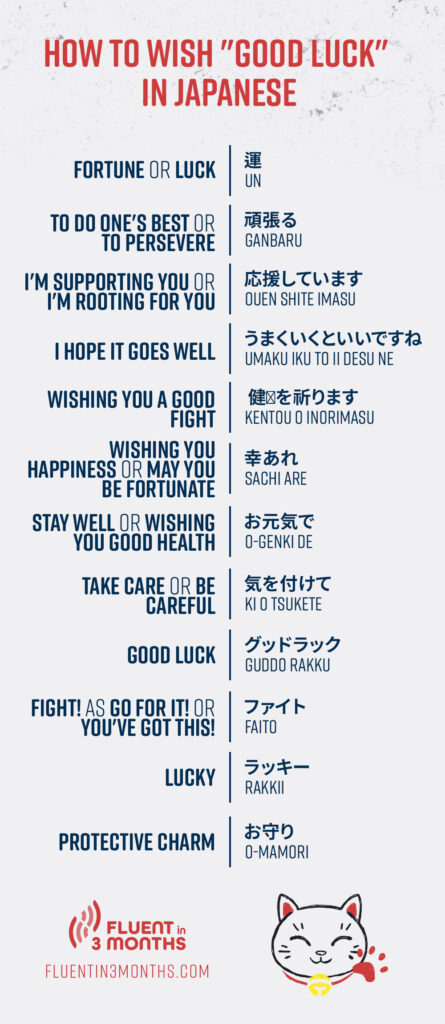
Cultural Insights: Does “Good Luck” Translate Directly?
The Japanese language is full of nouns related to luck or fortune, but they don’t really work as the English expression “good luck.”
In Japanese 運 (un) means “fortune” or “luck.” You can see it used in the phrase 運がいい (un ga ii), which literally means that their “un” is “good.” You can use this to describe people who are lucky. Similarly, there is the noun 幸運 (kouun), which translates to “good fortune” or “good luck.” But in Japanese, it doesn’t really make sense to wish someone to have un or kouun. Why?
Japanese expressions tend to lean more towards actions and efforts that lead to success. The essence of wishing someone well in Japan often centers around the individual’s effort and perseverance. The concepts of 努力 (doryoku, effort) and doing one’s best, 最善を尽くす (saizen o tsukusu) typically are more important the reliance on luck. Japanese culture celebrates the journey and dedication it takes to overcome obstacles, suggesting that we make our own luck through sustained effort and determination.
In other words, Japanese focuses on the fortunate end result of someone’s actions rather than the abstract idea of being graced by luck. It’s similar to recognizing that someone has reaped the rewards of their hard work; the emphasis remains on personal agency rather than sheer chance.
I had my fortune told at a shrine. It said I would be extremely lucky!
Using 頑張る (Ganbaru): The Most Common Ways to Wish Good Luck in Japanese
In most situations where you would want to wish someone luck in English, Japanese wishes you to 頑張る (ganbaru). Ironically, there’s no literal translation for this word in English. It means something like “to do one’s best.” So here are some common ways to conjugate this word and actually use it in Japanese!
頑張って (Ganbatte) – The Go-To Expression
The phrase 頑張って (ganbatte) is one of the most common ways to wish someone good luck in Japanese. Roughly equivalent to “do your best” or “hang in there,” it’s a versatile expression of support used among close friends and family. While it doesn’t directly translate to “good luck,” its underlying sentiment conveys encouragement to put forth one’s best effort, no matter the circumstance.
It’s a bit informal, so if you need to use it with someone higher ranking than you or someone you don’t know well, just add ください (kudasai) to it. So it’ll be 頑張ってください (ganbatte kudasai).
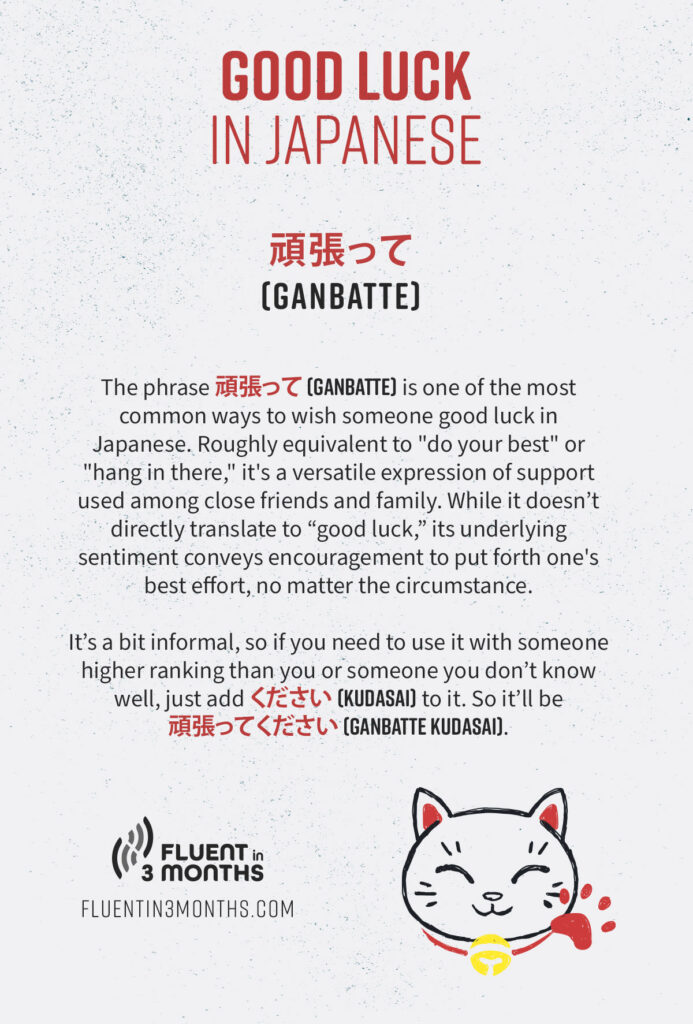
頑張れ (Ganbare) – The Imperative Form of Encouragement
A step up in intensity from ganbatte, 頑張れ (ganbare) serves as a rallying cry. It’s 頑張る (ganbaru) in the imperative form, which means it can be a bit rough and rude if used incorrectly since the imperative form of verbs is used much less in Japanese than English.
Like the above, it roughly means “Go for it!” or “You can do it!” and is often shouted from the sidelines during sports events. This expression is also sometimes used among peers or from elders to younger people. But if you don’t quite have a sense of whether it’s okay for you to use it in informal situations, just stick with 頑張って (ganbatte).
Examples of 頑張る (Ganbaru) in Conversation
Okay, so you know that 頑張る (ganbaru) is a great verb to use to wish someone luck. So how can we actually use it in a sentence? It’s quite easy!
Here are a few examples of how you can use 頑張る (ganbaru) in sentences to wish someone the equivalent of “good luck.”
Before a friend’s job interview: 「明日の面接、頑張って!」(Ashita no mensetsu, ganbatte!, “Do your best at the interview tomorrow!”)
Cheering at a soccer match: 「いけいけ、頑張れ!」(Ike ike, ganbare!, “Go go, you can do it!”)
To a colleague working on a project: 「このプロジェクト、頑張ってください。」(Kono purojekuto, ganbatte kudasai., “Please do your best on this project.”)
Japanese Expressions for Wishing Good Luck
Of course, there are more ways than 頑張る (ganbaru) to wish someone good luck in Japanese! Here are a few more phrases to keep in your arsenal:
応援しています (Ouen Shite Imasu) – Showing Support
応援しています (ouen shite imasu) phrase translates to “I’m supporting you” or “I’m rooting for you.” It’s warmer and more personal, often used when you want to express ongoing support for someone’s endeavors, such as a friend involved in a long-term project or embarking on a new venture.
This is the neutral polite way to say it. If you want to show close friends or family members support, you can change it to 応援している (ouen shite iru).
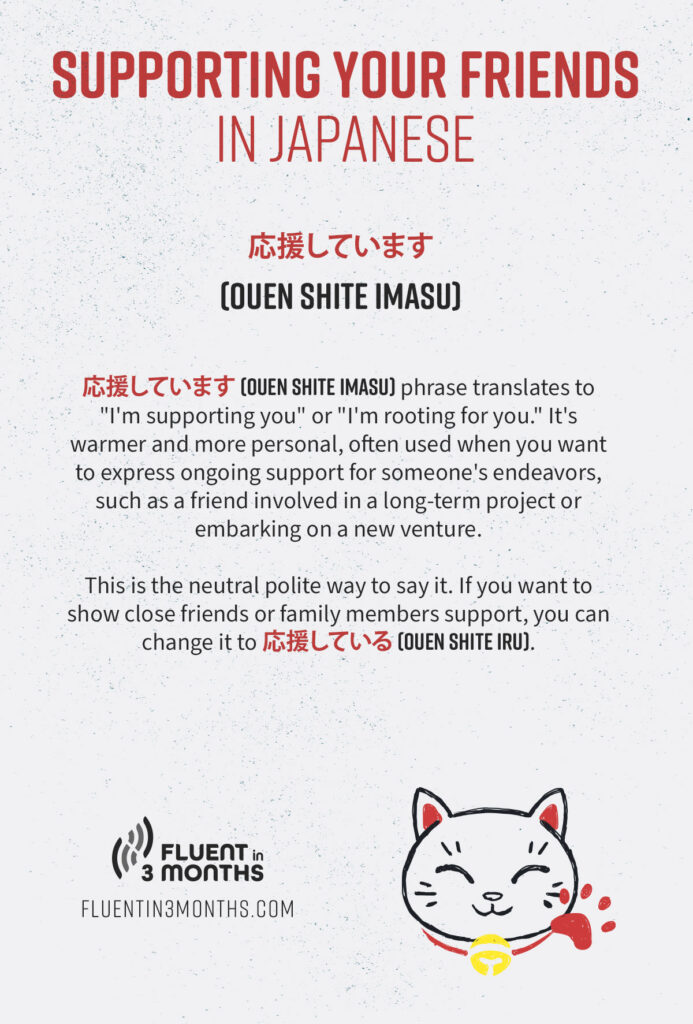
うまくいくといいですね (Umaku Iku to Ii Desu ne) – Hoping for Success
Literally meaning “I hope it goes well,” うまくいくといいですね (umaku iku to ii desu ne) softly conveys your wishes for someone’s success. It carries a friendly tone.
Again, this is a neutral polite way to say this phrase. To make it casual, say うまくいくといいね (umaku iku to ii ne).
健闘を祈ります (Kentou o Inorimasu) – For a Good Fight or Effort
Here’s a good luck phrase for more formal situations!
When you want to wish someone good luck in a contest or competition, 健闘を祈ります (kentou o inorimasu), which means “I pray for your good fight.” The “praying” part of this makes it quite a bit stiff and not used in everyday conversation much, although it is possible. You might also hear this used in business situations.
Even though this is a polite neutral form of the phrase, you’ll often see the politeness level bumped up even more to ご健闘をお祈りします (go-kentou o orinori shimasu). This might be used in a speech or a toast.
幸あれ (Sachi Are) – A Classical Wish for Happiness
幸あれ (sachi are) is a somewhat archaic and poetic way of wishing someone happiness or good fortune. While not common in everyday language, it might be used in a formal speech or a written message (like in a greeting card) to convey a heartfelt wish.
お元気で (O-genki de) – Wishing Good Health or Well-Being
Wishing someone お元気で (o-genki de) expresses a sincere wish for their continued health and prosperity. This phrase is often used when parting for a long time or in writing at the end of a correspondence.
気を付けて (Ki o Tsukete) – Wishing Someone Caution or Safety
Translated to “take care” or “be careful,” this phrase is a common way to express consideration for someone’s safety rather than luck. Use it when a friend is traveling, facing bad weather, or undertaking a potentially risky activity. So where English might wish someone luck, Japanese wishes caution.
This is a casual phrase, so to add formality to it, just add ください (kudasai) at the end.
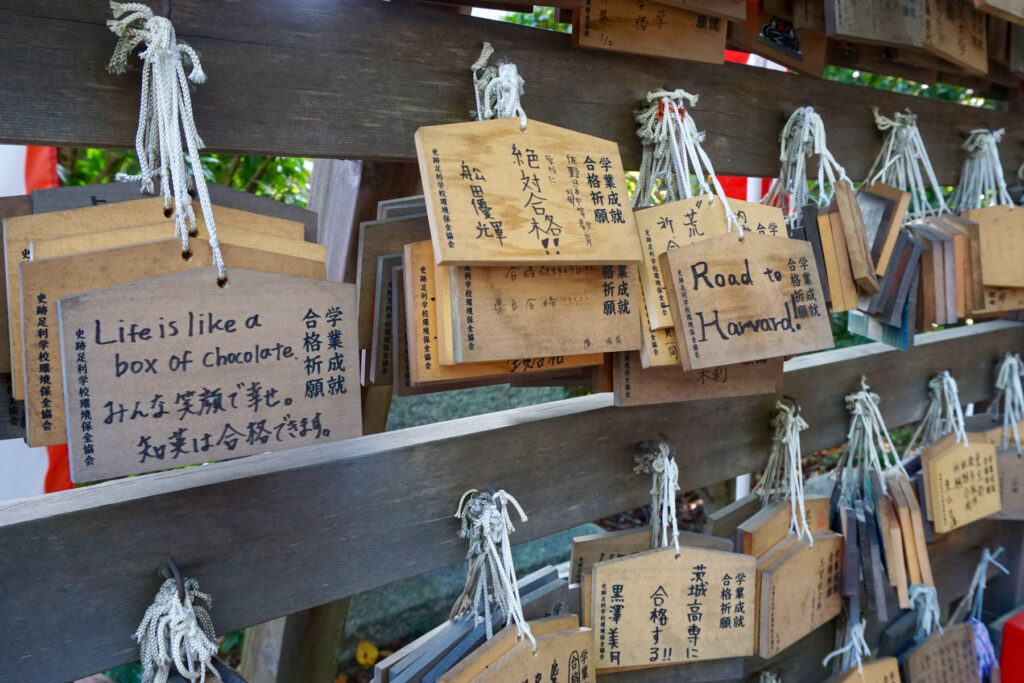
People in Japan will often write what they want good luck for at shrines and temples.
Phrases about Luck in Japanese Derived from English
Right, so there’s no exact equivalent inherently in Japanese to wish someone good luck. Japanese speakers enjoy playing with words and will often adopt foreign expressions that succinctly capture a feeling or sentiment that resonates with them. Moreover, such phrases can carry a trendy or modern connotation, making them attractive to especially the younger generations.
So sometimes, an English word can do the trick in Japanese! Here’s what you can use.
グッドラック (Guddo Rakku) – “Good Luck” from English
So sometimes, you might hear the phrase グッドラック (guddo rakku), which is how the Japanese would pronounce the English phrase “Good luck.”
It’s not actually used too much – mostly by young people trying to sound cool (kind of how all Americans might say the Spanish gracias instead of “thank you”). You might also see it in written form or in contexts heavily influenced by Western customs, such as international sports events.
ファイト (Faito) – Casual Encouragement Borrowed from English
Here’s another example of when the Japanese love to incorporate trendy foreign words into their language. ファイト (faito), derived from the English word “fight,” is an example of this. Used prominently among young people and in casual settings, it serves as an energetic cheer akin to “Go for it!” or “You’ve got this!”
By the way, if you’re a fan of K-culture, you’ll notice Korean has also had a similar idea. Korean slang has adopted the idea of English “fighting,” so they’ll say 파이팅 (hwaiting) in about the same context!
ラッキー (Rakkii) – Expressing Luck Casually
Here’s just an add on. We already know that you can say that someone’s 運がいい (un ga ii) to say that they’re “lucky.” You can also use the Japanese-English word for it!
“ラッキー” (Rakkii), directly taken from the English word “lucky,” is a lighthearted way to comment on good fortune in Japan. It’s a な (na) adjective (you can learn more about what I mean by this in our article about Japanese adjectives). It sounds weird, but it might also occasionally be used as a noun.
You might hear this word when someone finds money on the ground or wins a small prize, but it’s not usually the best choice for formal business situations.
Cultural Symbols of Luck and Protection in Japan
Japan is rich in symbols believed to bring luck, protection, and good fortune. Here are a few of the most popular good luck symbols and objects in Japanese culture:
お守り (O-mamori) – The Talisman for Luck and Safety
お守り (o-mamori) are amulets typically purchased at Shinto shrines and Buddhist temples throughout Japan. These charms are not just decorative; they serve a spiritual purpose, providing protection or bringing good luck in various aspects of life.
Ranging from success in education to traffic safety, o-mamori are tailored to specific needs or desires. Giving an o-mamori to someone embarking on a new journey or facing a challenge is a thoughtful way of wishing them good luck and safety.
For instance, a student may carry a 学業成就 (gakugyou-jouju) o-mamori to wish for success in their studies, while a traveler might have a 交通安全 (kōtsuu-anzen) o-mamori for safe journeys.
Lucky Animals: Cats, Koi, Cranes, Oh My!
There are also various lucky animals in Japanese culture. The 招き猫 (maneki-neko), or “beckoning cat,” is one such charm. Often seen in businesses and homes, this cat figurine with a raised paw is thought to attract customers and prosperity.
Other symbols include the 鯉 (koi), or carp, which symbolizes determination and strength due to its ability to swim upstream; the 鶴 (tsuru), or crane, representing longevity and good fortune; and the 亀 (kame), or tortoise, which is also associated with longevity and luck.

Koi fish are lucky symbols in Japan.
Real-life Dialogues Demonstrating the Use of a Variety of “Good Luck” Expressions
Okay, so you have a lot of phrases you can use. Here are some sample dialogues demonstrating how you can use them in context!
Situation 1: A Friend Prepares for a Job Interview
A: 明日の面接の準備はどう? (Ashita no mensetsu no junbi wa dou?)
B: うん、ちょっと緊張してる。 (Un, chotto kinchou shite’ru.)
A: 大丈夫、きっとうまくいくよ。頑張って! (Daijoubu, kitto umaku iku yo. Ganbatte!)
Translation:
A: How’s the preparation for tomorrow’s interview?
B: Well, I’m a bit nervous.
A: Don’t worry, it will surely go well. Good luck!
Situation 2: A Colleague Starts a New Project
A: 新しいプロジェクトが始まります。おめでとうございます!(Atarashii purojekuto ga hajimarimasu ne. Omedetou gozaimasu!)
B: はい、とてもわくわくしています。 (Hai, totemo wakuwaku shite imasu.)
A: 応援していますよ。健闘を祈ります! (Ouen shite imasu yo. Kentou o inorimasu!)
Translation:
A: You’re starting the new project, right? Congratulations!
B: Yes, I’m very excited.
A: I’m rooting for you. I wish you the best of luck!
Situation 3: Schoolchildren Talk Before an Exam
A: 明日、テストだね。 (Ashita, tesuto da ne.)
B: うん、勉強たくさんしたから大丈夫かな。 (Un, benkyou takusan shita kara daijoubu kana.)
A: 頑張れ!ラッキーを送るよ! (Ganbare! Rakkii o okuru yo!)
Translation:
A: You have a test tomorrow, right?
B: Yeah, I studied a lot, so I think it’ll be okay.
A: You can do it! Sending you lucky vibes!
Situation 4: A Neighbor Departs on a Trip
A: 明日から旅行ですってね。 (Ashita kara ryokou desu tte ne.)
B: ええ、楽しみにしています。 (Ee, tanoshimi ni shite imasu.)
A: いい旅行になりますように。気を付けて! (Ii ryokou ni narimasu you ni. Ki o tsukete!)
Translation:
A: You’re going on a trip from tomorrow, aren’t you?
B: Yes, I’m looking forward to it.
A: I hope it will be a good trip. Take care!
In each dialogue, the “good luck” expressions are chosen considering the relationship between speakers and the particular situation at hand. It demonstrates how cultural and social cues in Japan dictate not just the message but also the manner in which support and well-wishes are conveyed.
So whether it’s for an interview, a new opportunity, an upcoming test, or a travel adventure, each scenario calls for an expression that goes with the desired sentiment, relationship, and formality level.
Good Luck in Japanese
Throughout this article, we’ve looked at a variety of phrases to wish someone “good luck” in Japanese. Each conveys a unique sentiment, from the broadly used 頑張って (ganbatte) that cheers someone to do their best, to more specific wishes like 気を付けて (ki o tsukete) for caution and safety. We learned not just what to say, but how the cultural context shapes when and to whom these phrases are appropriately directed.
So as you go about your linguistic journey, remember that the phrases you learn are more than just words; they are carriers of culture, respect, and heartfelt sentiment. Use them to connect, encourage, and inspire — and watch as your relationships in the world of Japanese language and culture flourish. Ganbatte!

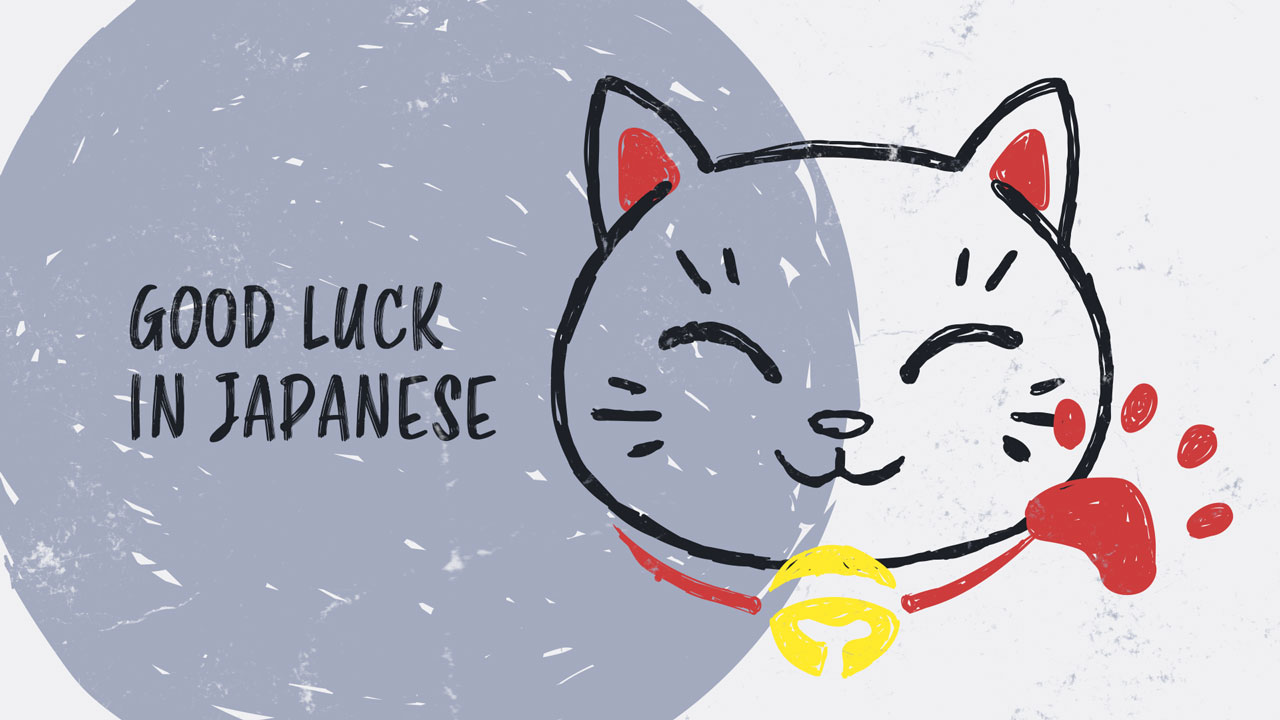
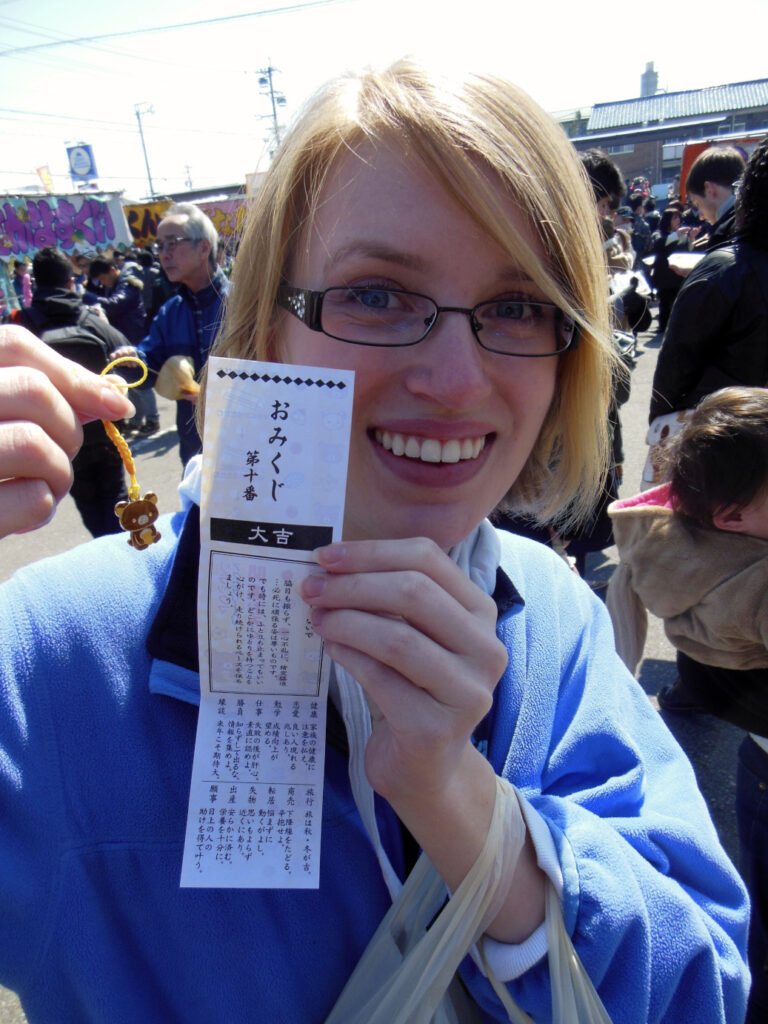

Social